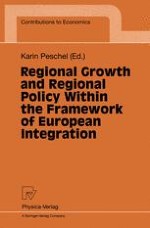1997 | Book
Regional Growth and Regional Policy Within the Framework of European Integration
Proceedings of a Conference on the Occasion of 25 Years Institute for Regional Research at the University of Kiel 1995
Editor: Prof. Dr. Karin Peschel
Publisher: Physica-Verlag HD
Book Series : Contributions to Economics
Included in: Professional Book Archive
